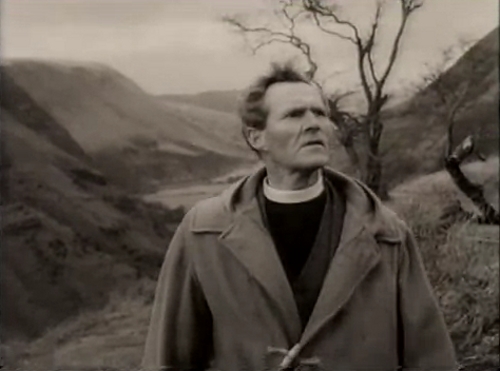Like Graham Sutherland’s paintings of Pembrokeshire, R S Thomas has an uncanny ability to combine the ancient and the now, the fear and the hope, the beauty and the degradation of the inner and outer landscape. There is an ominous quality to those paintings and to this poetry. These Uncollected Poems illuminate the duality of Thomas and his expectations; they reveal a man always in conflict with his intellect, his language and his God.
This new Bloodaxe collection contains some wonderful surprises. The dread and awareness of the digital age (“Technology stalls without the material we provide it”, The Computer Is Unable), the ceaseless march of corporate capitalism as evidenced in Oil –
“He’s a new man now
part of the machine
his nerves of metal and his blood oil”
– love (Luminaires) and a beautiful – and unexpected – tribute to fellow poet Ted Hughes. Uncollected Poems brings these many threads together for the first time to reveal a man screaming on the inside but screaming in the most perfect, economical verse. The Confessions of An Anglo-Welshman almost reads like a Morrissey lyric:
“No wound deletes
no patriotism dulls
the true and the beautiful
bequeathed to me by Blake,
Shelley and Shakespeare and the ravished Keats”
You could argue R.S. and Dylan Thomas still dominate the poetic landscape of Wales; their work, both emotionally and spiritually embedded in our psyche. The romantic against the realist; the raging doubt against the lust for life and their words are so great and powerful that they may deserve this domination. However, for me R.S. is the real truth seeker. In twelve lines he can express what an entire novel would take three hundred pages to say.
Often labelled the Welsh Solzhenitsyn/ogre/conscience, R.S. Thomas may well be all of these things but what really inspires is the poetry. As he quotes Saunders Lewis as saying, “All art is born out of tension.” R.S. Thomas became devoured by his own country but his words are truly universal and will resonate eternally. The rawness is at times unsettling, never has a poet found so much inspiration and complication in matters of language and nationhood; these words are born out of the deepest of love and the hardest of questions – the essence of humanity. As he writes:
“It is just that all my life
I tried to keep love from bursting its banks”
(The Father Dies).
There never will be a truce with the furies; the mirror will always reveal the truth however unpalatable. If R.S. Thomas is one thing, he is the mirror of Wales and the mirror to the human condition.
